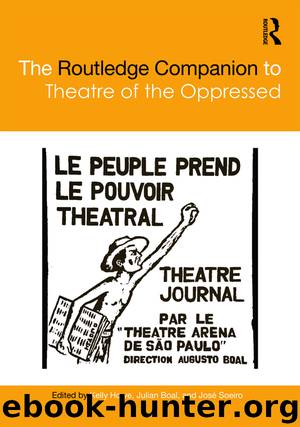The Routledge Companion to Theatre of the Oppressed by Howe Kelly;Boal Julian;Soeiro Jose;

Author:Howe, Kelly;Boal, Julian;Soeiro, Jose;
Language: eng
Format: epub
Publisher: Taylor & Francis (CAM)
Extending the market logic by means of a transformation of the state
Far from being an obstacle to the extension of the market logic, the state has become one of its main agents, if not its most important vehicle. The policy instruments inherited from the social-democratic and Keynesian era have become as many levers to internally reorient the logic and functioning of state action toward the wholesale transformation of society. It is therefore wholly absurd to conceive of such a transformation in terms of a limit on government intervention, a principle to which classical liberalism had sought to give a theoretical basis. Neoliberalism does not seek to limit, but to expand in a certain way the reach of the state. It transforms the state so as to extend the logic of the market.
Competition is what the “market logic” truly means, and it can be applied as such even to institutions that do not produce “commodities” in the strictest sense of the term, and that are not capitalist firms, as is the case of the public sector, for instance. The neoliberal rationality is characterized by its reframing of competition as the general form of all productive activities, in particular those that produce non-commodified services, as well as of all social relations even beyond the productive sphere itself. This universal logic of competition expands by means of a certain managerialization of practices, techniques, and discourses, which leads to the standardization of public, private, social, and individual activities, and to the homogenization at the level of society of all manners of being and doing.
The neoliberal state constructs markets and puts people in situations of competition. There is nothing natural to such competitive formations. They do not stem from spontaneous processes. Neither are they the effect of some “cannibalistic” tendencies inherent to the dynamic of capitalism. They rather result from a political construction. This construction operated of course through the “privatization” of state-owned companies as well as through the delegation and subcontracting of public activities for the benefit of private firms. When the situation was not “naturally” commodifiable, the alternative has been to instill competition both outside and inside departments, that is, to create a market situation without merchandise—or what we would call a quasi-market. Such has been the case with healthcare, education, research, and culture. Museums, schools, universities, or hospitals must be considered as firms competing against each other on a national or international battlefield. Meanwhile, everybody must yield to that logic as if it were natural that a museum, a school, or a hospital were an “enterprise.”
Download
This site does not store any files on its server. We only index and link to content provided by other sites. Please contact the content providers to delete copyright contents if any and email us, we'll remove relevant links or contents immediately.
| Acting & Auditioning | Broadway & Musicals |
| Circus | Direction & Production |
| History & Criticism | Miming |
| Playwriting | Puppets & Puppetry |
| Stage Lighting | Stagecraft |
Call Me by Your Name by André Aciman(19878)
Ready Player One by Cline Ernest(13947)
How to Be a Bawse: A Guide to Conquering Life by Lilly Singh(7148)
Wiseguy by Nicholas Pileggi(5300)
The Kite Runner by Khaled Hosseini(4942)
On Writing A Memoir of the Craft by Stephen King(4651)
Audition by Ryu Murakami(4604)
The Crown by Robert Lacey(4562)
Call me by your name by Andre Aciman(4460)
Gerald's Game by Stephen King(4359)
Harry Potter and the Cursed Child: The Journey by Harry Potter Theatrical Productions(4305)
Dialogue by Robert McKee(4149)
The Perils of Being Moderately Famous by Soha Ali Khan(4058)
Dynamic Alignment Through Imagery by Eric Franklin(3908)
Apollo 8 by Jeffrey Kluger(3503)
How to be Champion: My Autobiography by Sarah Millican(3491)
The Inner Game of Tennis by W. Timothy Gallwey(3461)
Seriously... I'm Kidding by Ellen DeGeneres(3405)
Darker by E L James(3398)
